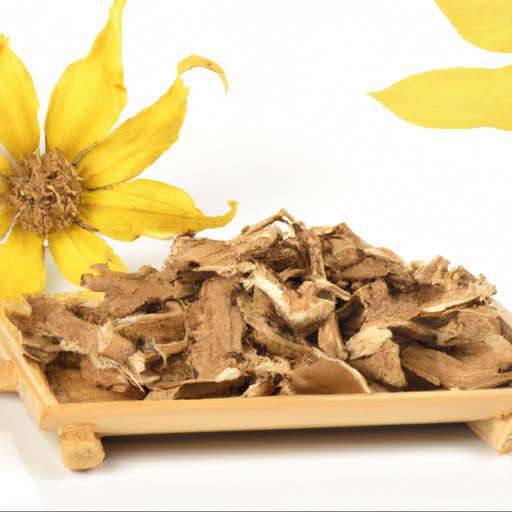Helianthus tuberosus, commonly known as Jerusalem artichoke, is a nutritious and delicious root vegetable native to North America. It has a nutty flavor and is a great source of fiber, vitamins, minerals, and antioxidants. Jerusalem artichokes are low in calories and can be eaten raw, boiled, steamed, or roasted.
They are also a great addition to salads, soups, and stews. Jerusalem artichokes can be used to make a variety of dishes, including casseroles, gratins, and even desserts.
They are a great way to add flavor and nutrition to any meal.
Nutritional benefits of helianthus tuberosus

Helianthus tuberosus, commonly known as Jerusalem artichoke, is a type of sunflower native to North America. It is a fast-growing perennial plant that is grown for its edible tubers. These tubers are rich in various nutrients like dietary fiber, proteins, vitamins, and minerals such as selenium, manganese, potassium, calcium, and iron.
Moreover, research has found that consumption of Jerusalem artichoke is also beneficial for its diuretic, digestive, and anti-inflammatory properties. Studies have revealed that the Jerusalem artichoke provides many essential micronutrients that can help fortify the body’s systems and keep them running healthily.
For instance, dietary fiber helps the body maintain regular bowel movements and lowers cholesterol levels, while proteins support the formation of muscle tissues and organs. Additionally, vitamins and minerals in Jerusalem artichokes aid in the absorption of nutrients and even protect the body against various illnesses. Furthermore, the Jerusalem artichoke is also beneficial for its natural diuretic and digestive effects.
This can help to increase urine production and aid in the elimination of toxins from the body. In addition, researchers have also found that Jerusalem artichokes have an anti-inflammatory effect due to its high concentrations of flavonoids, which can help reduce swelling and reduce pain.
All in all, consuming Jerusalem artichoke is an ideal way to help maintain a healthy lifestyle. The nutritional benefits of this plant are vast, providing essential micronutrients, diuretic, digestive, and anti-inflammatory properties.
Therefore, it’s important to add Jerusalem artichoke to your diet. Whether you enjoy the straightforward tubers in their raw form or roasted, by boiling or steaming, or even in soups and stews, you can enjoy the numerous health benefits of this amazing vegetable.
Health benefits of helianthus tuberosus

Helianthus tuberosus, more commonly known as the Jerusalem Artichoke, is a highly beneficial and versatile vegetable with a nutty, sweet flavor. Not only is it packed with essential vitamins, nutrients and mineral that can help keep us healthy, it has also been shown to help improve heart health and promote weight loss.
With its distinct flavor profile, Jerusalem artichokes are an excellent addition to many dishes, both starters and main courses alike. A true powerhouse when it comes to nutrition, Jerusalem Artichokes contain up to seven times more inulin than other root vegetables, helping to maintain an overall healthy digestive system. Inulin plays an important role in helping to reduce cholesterol and optimize glucose levels in the body.
It is also high in Vitamin A and C, magnesium, zinc and iron, making it an excellent source of essential vitamins and minerals. In addition to its impressive nutritional profile, Jerusalem Artichoke is incredibly versatile and can be enjoyed in many different ways. Its unique flavor pairs nicely with fish, pork or poultry dishes when boiled, fried, or roasted.
It can also be added to sweet dishes such as cakes and crisps for an exciting twist. For those looking for a healthier option, the vegetable can be enjoyed raw in salads or even juiced.
Simmered in a soup or mashed into a creamy puree, the nutty flavor of Jerusalem artichoke is sure to be a hit no matter what you concoct in the kitchen. Overall, the Jerusalem Artichoke is an excellent addition to any healthy diet. Packed with essential vitamins and minerals, it is a great source of dietary fiber and can help promote heart health and weight loss.
With its sweet and nutty taste, this delicious and highly nutritious vegetable is sure to jazz up any meal.
How to grow helianthus tuberosus

Helianthus tuberosus, commonly referred to as Jerusalem artichoke, is a unique, hardy and versatile multi-purpose perennial vegetable, native to North America. This sunflower-like plant has a history of both medicinal and food applications and is ideal for home gardens. Growing helianthus tuberosus can be a rewarding experience, yielding delicious, nutty-flavored tubers full of nutrients.
One of the best things about helianthus tuberosus is that it is incredibly easy to grow. All you need is a sunny spot in your garden and some good soil.
You can either grow helianthus tuberosus from seed or tubers. If you opt to grow it from seed, you will need to start it indoors in the late winter or early spring, and then wait until danger of frost has passed before planting it outside.
If you are planting tubers, you can skip the starting indoors step, as you can plant them directly into the garden soil. Just make sure the soil is nice and moist, as this will help ensure a bumper crop of tubers. You will need to keep the soil moist and weed-free to ensure healthy growth and to encourage optimal tuber production.
Make sure to give the plants plenty of sunlight, as this will help them grow strong and healthy. Mulching is also a great way to retain moisture and reduce weeds.
As the season progresses, you will begin to notice small, yellow flowers blooming on the stalks of your helianthus tuberosus. The tubers will be ready to harvest before the first frost of the season. Just carefully dig up the tubers and enjoy the nutty, delicious flavor of your own homegrown helianthus tuberosus.
Recipes using helianthus tuberosus
Helianthus tuberosus, commonly known as the Jerusalem artichoke, is an incredibly versatile vegetable that can be used in a huge variety of recipes. This hardy tuber comes from the sunflower family and is actually related to the daisy rather than the artichoke. This makes it a great choice if you are looking for healthy, low-carb and gluten-free recipes.
As the Jerusalem artichoke is a root vegetable, its flavor profile is mild and slightly sweet. It’s crunchy flesh is a great contrast to other ingredients, making it a key part to many delicious dishes.
Its versatility means it can be used in both savory and sweet recipes, making it a great alternative to potatoes. Roasting the Jerusalem artichokes brings out their sweetness, while the lighter-tasting shoots and leaves are great added to salads and sandwiches.
One of the most popular recipes starring the Jerusalem artichoke is the garlic and rosemary roasted Jerusalem artichokes. This simple dish packs a lot of flavor from the rosemary and garlic, and makes a great side dish to any meal. Another winning recipe with this vegetable is the baked Jerusalem artichoke dip.
Perfect for a party snack or a satisfying lunch, the dip combines the natural sweetness of the artichokes with creamy Greek yogurt and a hint of Parmesan cheese. For a light and healthy snack, why not try oven-roasted Jerusalem artichokes chips?
Simply cut the artichokes into thin slices and cook until crispy. Finally, you can’t go wrong with a Jerusalem artichoke soup. This comforting dish combines the artichokes with an array of vegetables and herbs to create a simple and flavorful soup.
So if you’re feeling adventurous and want to try something a bit different, why not give the Jerusalem artichoke a try! With so many delicious recipes to choose from, you’re sure to find the perfect dish for you.
Our video recommendation
Conclusion
Helianthus tuberosus, also known as Jerusalem artichoke, is a species of sunflower native to North America. It is a hardy, drought-tolerant plant that produces edible tubers.
The tubers are high in dietary fiber and contain vitamins such as vitamin C and B-complex vitamins, as well as minerals such as iron and potassium. They are a great source of energy and can be cooked and eaten in a variety of ways. Jerusalem artichokes are a nutritious and versatile addition to any diet.
FAQ
What are the health benefits of Helianthus tuberosus?
The health benefits of Helianthus tuberosus include improved digestion, reduced inflammation, improved heart health, and improved blood sugar levels. It is also rich in antioxidants, which can help protect against free radical damage and reduce the risk of certain diseases. Additionally, Helianthus tuberosus is a good source of dietary fiber, which can help promote regularity and reduce the risk of certain digestive disorders.
What is the nutritional value of Helianthus tuberosus?
Helianthus tuberosus is a nutritious root vegetable that is high in dietary fiber, vitamin C, potassium, and magnesium. It also contains iron, calcium, and other essential vitamins and minerals.
How is Helianthus tuberosus used in traditional medicine?
Helianthus tuberosus, commonly known as Jerusalem artichoke, has been used in traditional medicine for centuries to treat a variety of ailments. It is believed to have anti-inflammatory, antioxidant, and anti-diabetic properties. It is also used as a digestive aid and to treat skin conditions such as eczema and psoriasis. Additionally, it is believed to help regulate blood sugar levels, reduce cholesterol, and aid in weight loss.
What are the different varieties of Helianthus tuberosus?
The different varieties of Helianthus tuberosus include ‘Red Pontiac’, ‘Ozette’, ‘All-Red’, ‘Purple Majesty’, ‘White Cloud’, ‘Butterball’, and ‘Fiesta’.
How is Helianthus tuberosus grown?
Helianthus tuberosus is grown from tubers, which are planted in the spring after the last frost. They require full sun and well-drained soil. They should be watered regularly and fertilized every few weeks.
What are the environmental benefits of Helianthus tuberosus?
Helianthus tuberosus, commonly known as Jerusalem artichoke, has many environmental benefits. It is a hardy perennial plant that is drought-tolerant and can be grown in many different climates. It is also a nitrogen-fixing plant, meaning it helps to improve soil fertility and reduce the need for chemical fertilizers. Additionally, it is a great source of food for wildlife, providing a variety of nutrients for birds, mammals, and insects.

